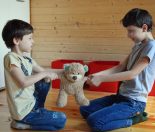The importance of talking to young children, sharing memories with real intent, has never been more important. Researchers have found that quality memory sharing in early childhood creates significant wellbeing benefits later in life.
How mothers share memories with their children during toddlerhood impacts mental health and well-being in early adulthood, a University of Otago study has shown.
Researchers found 21-year-olds told more coherent stories about turning points in their lives if their mothers were taught new conversational techniques two decades earlier.
These adults also reported fewer symptoms of depression and greater self-esteem compared to
adults in the study whose mothers interacted with them as usual.”
The study, published in Journal of Research in Personality, is a long-term follow-up of a reminiscing intervention in which 115 mothers of toddlers were assigned to either a control group or taught to use elaborative reminiscing for a year.
Elaborative reminiscing involves open, enriched, and responsive conversations with children about shared experiences of everyday events. This is the first study to show long-term benefits of mother-child reminiscing for emerging adult development.
Lead author Sean Marshall, a PhD candidate in the Department of Psychology, says understanding ways to improve the mental health of 18 to 25-year-olds is important because of their unique stage of life.
“Emerging adults face a volley of challenges as they leave home and enter university or the workforce.
“We wanted to understand how well children cope with new challenges as they enter adulthood and find ways to ease the psychological stress that typically accompanies these transitions,” he says.
Project lead Professor Elaine Reese, of the Department of Psychology, says the “soft-touch intervention” in early childhood proved to have enduring benefits for psychological well-being and mental health.
“This study is the first of its kind and is informing new interventions at home and in schools with parents and teachers of young children,” she says.
The researchers intend to continue the study, which was initially funded by the Marsden Fund of the Royal Society Te Apārangi, later in adulthood to investigate the potential mechanisms driving the observed mental health and well-being benefits.
Sharing Memories with Toddlers – Elaborative reminiscing
After you learn more about memory-sharing with your toddler, you can learn more about how children learn through communication.
Elaine Reese, Professor of Psychology at the University of Otago, suggests the following five simple steps for sharing memories with your toddler. These are the same tips that parents were taught in the original study.
1. Select events your toddler finds interesting
The best events are those your child brings up spontaneously. For example, a toddler might say “baa baa” when you’re driving past a farm, referring to a farm visit the previous week.
2. Draw your toddler in with what, where, who, when questions
Each question, such as “what did you see at the farm?”, can add a bit more detail. It’s good to pause after a question to give your child time to respond: “Baa baa.”
3. Respond warmly and enthusiastically to your toddler
Praise your child’s responses: “Little baby lamb. Clever girl!” And follow up with related questions: “What did you do with the lambs?”
4. If your toddler doesn’t respond
To keep the conversation going, rephrase your question with new information, for example: “What did you give to the lambs?” After a pause, you can ask: “Did you give them a bottle?”
5. Most of all, keep it fun
End the conversation when your toddler loses interest. As your child gets older, you can adapt these same techniques to talk about more significant topics.
Check out our Toddler development section for more expert advice on toddler and preschooler development and behaviour.






